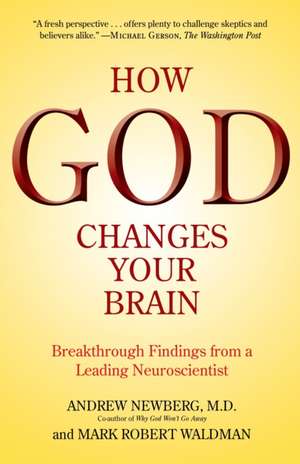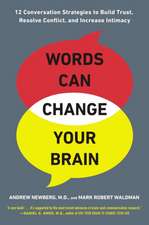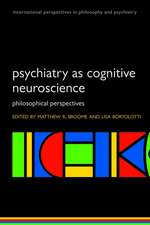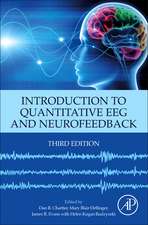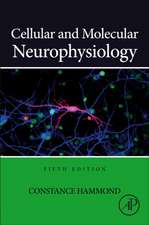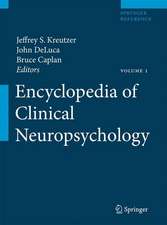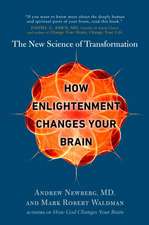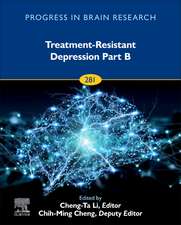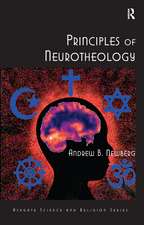How God Changes Your Brain
Autor MD Newberg, Andrew B., Mark Robert Waldmanen Limba Engleză Paperback – 26 apr 2010
• Not only do prayer and spiritual practice reduce stress, but just twelve minutes of meditation per day may slow down the aging process.
• Contemplating a loving God rather than a punitive God reduces anxiety and depression and increases feelings of security, compassion, and love.
• Fundamentalism, in and of itself, can be personally beneficial, but the prejudice generated by extreme beliefs can permanently damage your brain.
• Intense prayer and meditation permanently change numerous structures and functions in the brain, altering your values and the way you perceive reality.
Both a revelatory work of modern science and a practical guide for readers to enhance their physical and emotional health, How God Changes Your Brain is a first-of-a-kind book about faith that is as credible as it is inspiring.
Preț: 88.79 lei
Preț vechi: 106.94 lei
-17% Nou
Puncte Express: 133
Preț estimativ în valută:
16.99€ • 17.79$ • 14.06£
16.99€ • 17.79$ • 14.06£
Carte disponibilă
Livrare economică 17-24 martie
Livrare express 28 februarie-06 martie pentru 39.70 lei
Preluare comenzi: 021 569.72.76
Specificații
ISBN-13: 9780345503428
ISBN-10: 0345503422
Pagini: 348
Ilustrații: Charts/Photos throughout
Dimensiuni: 133 x 207 x 20 mm
Greutate: 0.28 kg
Editura: BALLANTINE BOOKS
ISBN-10: 0345503422
Pagini: 348
Ilustrații: Charts/Photos throughout
Dimensiuni: 133 x 207 x 20 mm
Greutate: 0.28 kg
Editura: BALLANTINE BOOKS
Notă biografică
Andrew Newberg, M.D., is the director of the Center for Spirituality and the Mind at the University of Pennsylvania. He is one of the founders of the new interdisciplinary field called neurotheology. He is an associate professor in the department of radiology, with secondary appointments in the departments of psychiatry and religious studies, at the University of Pennsylvania. His work has been featured on Good Morning America, Nightline, Discovery Channel, BBC, NPR, and National Geographic Television. He is the co-author of Why God Won’t Go Away, Born to Believe, and The Mystical Mind.
Mark Robert Waldman is an associate fellow at the Center for Spirituality and the Mind at the University of Pennsylvania. He is a therapist, the author or co-author of ten books, including Born to Believe (with Andrew Newberg), and was the founding editor of Transpersonal Review. He lectures throughout the country on neuroscience, religion, and spirituality and conducts research with numerous religious and secular groups. His work has been featured in dozens of newspapers and magazines and on syndicated radio programs.
From the Hardcover edition.
Mark Robert Waldman is an associate fellow at the Center for Spirituality and the Mind at the University of Pennsylvania. He is a therapist, the author or co-author of ten books, including Born to Believe (with Andrew Newberg), and was the founding editor of Transpersonal Review. He lectures throughout the country on neuroscience, religion, and spirituality and conducts research with numerous religious and secular groups. His work has been featured in dozens of newspapers and magazines and on syndicated radio programs.
From the Hardcover edition.
Extras
Chapter One
Religion and the human brain
Our time is distinguished by wonderful achievements in the fields of scientific understanding and the technical application of those insights. Who would not be cheered by this? But let us not forget that knowledge and skills alone cannot lead humanity to a happy and dignified life. Humanity has every reason to place the proclaimers of high moral standards and values above the discoverers of objective truth. What humanity owes to personalities like Buddha, Moses, and Jesus ranks for me higher than all the achievements of the inquiring and constructive mind.—Albert Einstein, The Human Side
Who cares about God? Prelude to a Neurological and Spiritual Revolution
God.
In America, I cannot think of any other word that stirs up the imagination more. Even young children raised in nonreligious communities understand the concept of God, and when asked, will willingly draw you a picture-usually the proverbial old man with the long hair and a beard. As children grow into adults, their pictures of God often evolve into abstract images of clouds, spirals, sunbursts, and even mirrors, as they attempt to integrate the properties of a reality they cannot see. In fact, the more a person thinks about God, the more complex and imaginative the concept becomes, taking on unique nuances of meaning that differ from one individual to the next.
If you contemplate God long enough, something surprising happens in the brain. Neural functioning begins to change. Different circuits become activated, while others become deactivated. New dendrites are formed, new synaptic connections are made, and the brain becomes more sensitive to subtle realms of experience. Perceptions alter, beliefs begin to change, and if God has meaning for you, then God becomes neurologically real. For some, God may remain a primitive concept, limited to the way a young child interprets the world. But for most people, God is transformed into a symbol or metaphor representing a wide range of personal, ethical, social, and universal values. And, if you happen to be a neuroscientist, God can be one of the most fascinating of human experiences to explore.
The Science of God
For the past fifteen years I have investigated the neural mechanisms of spirituality with the same fervor that a minister contemplates God. Some religious rituals do nothing more than relax you, others help to keep you focused and alert, but a few appear to take practitioners into transcendent realms of mystical experience where their entire lives are changed.
Our research team at the University of Pennsylvania has consistently demonstrated that God is part of our consciousness and that the more you think about God, the more you will alter the neural circuitry in specific parts of your brain. That is why I say, with the utmost confidence, that God can change your brain. And it doesn't matter if you're a Christian or a Jew, a Muslim or a Hindu, or an agnostic or an atheist. In Why God Won't Go Away, I demonstrated that the human brain is uniquely constructed to perceive and generate spiritual realities.1 Yet it has no way to ascertain the accuracy of such perceptions. Instead, our brain uses logic, reason, intuition, imagination, and emotion to integrate God and the universe into a complex system of personal values, behaviors, and beliefs.
But no matter how hard we try, the ultimate nature of the universe continues to elude our brain. So the bigger questions remain. Where does life originate, where does it end, and what ultimate purpose does it serve? Is there a spiritual reality, or is it merely a fabrication of the mind? If there is a God, does such an entity reach out to us like the hand that Michelangelo painted on the ceiling of the Sistine Chapel? Or is it the other way around: Does our mind reach out to embrace a God that may or may not be real?
Neuroscience has yet to answer such questions, but it can record the effect that religious beliefs and experiences have upon the human brain. Furthermore, it can tell us how God-as an image, feeling, thought, or fact-is interpreted, reacted to, and turned into a perception that feels meaningful and real. But neuroscience cannot tell you if God does or doesn't exist. In fact, as far as we can tell, most of the human brain does not even worry if the things we see are actually real. Instead, it only needs to know if they are useful for survival. If a belief in God provides you with a sense of comfort and security, then God will enhance your life. But if you see God as a vindictive deity who gives you justification for inflicting harm on others, such a belief can actually damage your brain as it motivates you to act in socially destructive ways.
Having an accurate perception of reality is not one of the brain's strong points. Indeed, as Mark and I pointed out in Why We Believe What We Believe,* the human brain seems to have difficulty separating fantasies from facts.2 It sees things that are not there, and it sometimes doesn't see things that are there. In fact, the brain doesn't even try to create a fully detailed map of the external world. Instead, it selects a handful of cues, then fills in the rest with conjecture, fantasy, and belief. Rather than being a hindrance, such neurological ambiguity allows us to imagine and create a world filled with utopian, utilitarian, and sometimes useless things-from eye protectors for chickens to electronic corneas for the blind.
Likewise, when it comes to thinking about God, our brain creates a vast range of utopian, utilitarian, and sometimes useless theologies-from complex moral value systems to the number of angels that can fit on the head of a pin. But no matter how comprehensive our theologies become, our brain is rarely satisfied with its concepts and images of God. The end result of this remarkable contemplation has been the creation of thousands of differing spiritual practices and creeds.
Indeed, the more one contemplates God, the more mysterious God becomes. Some embrace this emergent ambiguity, some are frightened by it, some ignore it, and others reject it in its entirety. But the fact remains that every human brain, from early childhood on, contemplates the possibility that spiritual realms exist. Believers like Isaac Newton, agnostics like Charles Darwin, and atheists like Richard Dawkins have all given serious consideration to humanity's fascination with God, because the moment God is introduced to the human brain, the neurological concept will not go away.
Recently there has been a spate of antireligious books-among them, The God Delusion, Richard Dawkins; The End of Faith, Sam Harris; and God Is Not Great, Christopher Hitchens-that argue that religious beliefs are personally and societally dangerous. But the research, as we will outline throughout this book, strongly suggests otherwise. Nor do we believe that these authors represent the views of the vast majority of scientists or atheists. For example, though I am not specifically religious, I'm open to the possibility that God may exist, whereas Mark, my colleague and co-researcher, prefers to look at the universe through a purely naturalistic and evidence-based perspective. Yet we both appreciate and encourage religious and spiritual development-as long as it does not denigrate the lives or religious beliefs of others.
For the past four years, Mark and I have been studying how different concepts of God affect the human mind. I have brain-scanned Franciscan nuns as they immersed themselves in the presence of God, and charted the neurological changes as Buddhist practitioners contemplated the universe. I have watched what happens in the brains of Pentecostal practitioners who invited the Holy Spirit to speak to them in tongues, and have seen how the brains of atheists react-and don't react-when they meditate on a concrete image of God.
Along with my research staff at the University of Pennsylvania and the Center for Spirituality and the Mind, we are currently studying Sikhs, Sufis, yoga practitioners, and advanced meditators to map the neurochemical changes caused by spiritual and religious practices. Our research has led us to the following conclusions:
1. Each part of the brain constructs a different perception of God.
2. Every human brain assembles its perceptions of God in uniquely different ways, thus giving God different qualities of meaning and value.
3. Spiritual practices, even when stripped of religious beliefs, enhance the neural functioning of the brain in ways that improve physical and emotional health.
4. Intense, long-term contemplation of God and other spiritual values appears to permanently change the structure of those parts of the brain that control our moods, give rise to our conscious notions of self, and shape our sensory perceptions of the world.
5. Contemplative practices strengthen a specific neurological circuit that generates peacefulness, social awareness, and compassion for others.
Spiritual practices also can be used to enhance cognition, communication, and creativity, and over time can even change our neurological perception of reality itself. Yet, it is a reality that we cannot objectively confirm. Instead, our research has led us to conclude that three separate realities intermingle to give us a working model of the world: the reality that actually exists outside of our brain, and two internal realities-maps that our brain constructs about the world. One of these maps is subconscious and primarily concerned with survival and the biological maintenance of the body. But this map is not the world itself; it's just a guide that helps us navigate the terrain. Human beings, however, construct a second internal reality-a map that reflects our conscious awareness of the universe. This consciousness is very different from the subconscious map formed by our sensory and emotional circuits. We know that these two internal maps exist, but we have yet to discover if, and to what degree, these two inner realities communicate with each other.
Overall, our consciousness represents a reality that is the farthest removed from the world that actually exists outside of the brain. Thus, if God does exist, there would be three separate realities to consider: the God that exists in the world, our subconscious perception of that God, and the conscious images and concepts that we construct in a very small part of our frontal, temporal, and parietal lobes. It has been my goal to show that spiritual practices may help us to bridge the chasm between these inner and outer realities, which would then bring us closer to what actually exists in the world. I still don't know if it's possible, but the health benefits associated with meditation and religious ritual cannot be denied.
Organization of this Book
In the first two sections we will explore the neural correlates of spiritual experiences that our research has uncovered. The third section is filled with practical exercises that anyone can use to enhance the physical, emotional, cognitive, and communication processes of the brain.
In Chapter 2-"Do You Even Need God when You Pray?"-we'll describe our recent study showing how spiritual practices improve memory, and how they can slow down neurological damage caused by growing old. Our memory study also demonstrates that if you remove the spiritual references, religious rituals will still have a beneficial effect on the brain. We'll also show you how to create and personalize your own "memory enhancement" meditation.
In Chapter 3-"What Does God Do to Your Brain?"-we'll explore the neural varieties of meditation and prayer, explaining how different parts of the brain create different perceptions of God. We'll tell you how God becomes neurologically real and show you how different neurochemicals and drugs alter your spiritual beliefs.
In Chapter 4-"What Does God Feel Like?"-we'll share with you the surprising findings from our online Survey of Spiritual Experiences. Our data suggests that God is more of a feeling than an idea, that nearly everyone's spiritual experience is unique, and that these experiences often generate long-lasting states of unity, peacefulness, and love. Furthermore, they have the power to change people's religious and spiritual orientations, as well as the way they interact with others.
In Chapter 5-"What Does God Look Like?"-we'll show you what we discovered when we compared adult drawings of God with pictures drawn by children. We'll explain why some atheists maintain childhood images, while others draw sophisticated renditions, and share with you how agnostics tend to react when they explore their notions of God. We will also explain why each of us may have a single "God" neuron or circuit that slowly expands the more we contemplate religious ideas.
In Chapter 6-"Does God Have a Heart?"-we'll describe how Americans project different personalities onto God, and how each of these perspectives affect the neural functioning of the brain. We will also explain how God culturally evolved from an authoritarian, punitive deity to become a force that is filled with compassion and love. This "mystical" element of God affects a very important part of the brain, called the anterior cingulate, which we need to nurture as we engage in a pluralistic world filled with different perceptions of the divine.
In Chapter 7-"What Happens when God Gets Mad?"-we'll delve more deeply into the neurological dangers of anger, fear, authoritarianism, and idealism. We will also explain why everyone-believers and nonbelievers alike-is born with a built-in fundamentalist framework that is deeply embedded in the neurological circuitry of the brain.
In Chapter 8-"Exercising Your Brain"-we'll tell you about the eight best ways to keep your brain physically, mentally, and spiritually tuned-up. Three of these techniques are directly related to the neurological principles underlying meditation, but I think several of them will surprise you, especially the one that we think may be most essential for maintaining a healthy brain. They are all relatively easy to do, and we will give you pointers on how to integrate them into your daily life. We'll even show you how you can arouse your precuneus-which may be the central circuit of human consciousness-in less than sixty seconds.
In Chapter 9-"Finding Serenity"-we have used the findings from our neurological research to create a personalized "brain enhancement" program that will help you reduce stress, become more attentive and alert, develop greater sensitivity and empathy, and generally improve the overall functioning of your brain. We'll explain the three key principles of meditation and guide you through twelve exercises that you can practice at home. Included are three simple techniques to defuse anger, the emotion most likely to interfere with the normal functioning of your brain.
In Chapter 10-"Compassionate Communication"-we integrate the techniques from the previous two chapters into a new exercise that can be done while you are engaged in conversation with someone else. In less than fifteen minutes a compassionate and intimate dialogue unfolds that undermines the normal defensive behaviors we usually employ in social situations. We are currently conducting brain-scan research to document the neurological benefits associated with this "Compassionate Communication" exercise, and we will instruct you on how to practice it with family members and friends. We'll also enumerate twenty-one strategies that you can use to effectively resolve interpersonal problems.
From the Hardcover edition.
Religion and the human brain
Our time is distinguished by wonderful achievements in the fields of scientific understanding and the technical application of those insights. Who would not be cheered by this? But let us not forget that knowledge and skills alone cannot lead humanity to a happy and dignified life. Humanity has every reason to place the proclaimers of high moral standards and values above the discoverers of objective truth. What humanity owes to personalities like Buddha, Moses, and Jesus ranks for me higher than all the achievements of the inquiring and constructive mind.—Albert Einstein, The Human Side
Who cares about God? Prelude to a Neurological and Spiritual Revolution
God.
In America, I cannot think of any other word that stirs up the imagination more. Even young children raised in nonreligious communities understand the concept of God, and when asked, will willingly draw you a picture-usually the proverbial old man with the long hair and a beard. As children grow into adults, their pictures of God often evolve into abstract images of clouds, spirals, sunbursts, and even mirrors, as they attempt to integrate the properties of a reality they cannot see. In fact, the more a person thinks about God, the more complex and imaginative the concept becomes, taking on unique nuances of meaning that differ from one individual to the next.
If you contemplate God long enough, something surprising happens in the brain. Neural functioning begins to change. Different circuits become activated, while others become deactivated. New dendrites are formed, new synaptic connections are made, and the brain becomes more sensitive to subtle realms of experience. Perceptions alter, beliefs begin to change, and if God has meaning for you, then God becomes neurologically real. For some, God may remain a primitive concept, limited to the way a young child interprets the world. But for most people, God is transformed into a symbol or metaphor representing a wide range of personal, ethical, social, and universal values. And, if you happen to be a neuroscientist, God can be one of the most fascinating of human experiences to explore.
The Science of God
For the past fifteen years I have investigated the neural mechanisms of spirituality with the same fervor that a minister contemplates God. Some religious rituals do nothing more than relax you, others help to keep you focused and alert, but a few appear to take practitioners into transcendent realms of mystical experience where their entire lives are changed.
Our research team at the University of Pennsylvania has consistently demonstrated that God is part of our consciousness and that the more you think about God, the more you will alter the neural circuitry in specific parts of your brain. That is why I say, with the utmost confidence, that God can change your brain. And it doesn't matter if you're a Christian or a Jew, a Muslim or a Hindu, or an agnostic or an atheist. In Why God Won't Go Away, I demonstrated that the human brain is uniquely constructed to perceive and generate spiritual realities.1 Yet it has no way to ascertain the accuracy of such perceptions. Instead, our brain uses logic, reason, intuition, imagination, and emotion to integrate God and the universe into a complex system of personal values, behaviors, and beliefs.
But no matter how hard we try, the ultimate nature of the universe continues to elude our brain. So the bigger questions remain. Where does life originate, where does it end, and what ultimate purpose does it serve? Is there a spiritual reality, or is it merely a fabrication of the mind? If there is a God, does such an entity reach out to us like the hand that Michelangelo painted on the ceiling of the Sistine Chapel? Or is it the other way around: Does our mind reach out to embrace a God that may or may not be real?
Neuroscience has yet to answer such questions, but it can record the effect that religious beliefs and experiences have upon the human brain. Furthermore, it can tell us how God-as an image, feeling, thought, or fact-is interpreted, reacted to, and turned into a perception that feels meaningful and real. But neuroscience cannot tell you if God does or doesn't exist. In fact, as far as we can tell, most of the human brain does not even worry if the things we see are actually real. Instead, it only needs to know if they are useful for survival. If a belief in God provides you with a sense of comfort and security, then God will enhance your life. But if you see God as a vindictive deity who gives you justification for inflicting harm on others, such a belief can actually damage your brain as it motivates you to act in socially destructive ways.
Having an accurate perception of reality is not one of the brain's strong points. Indeed, as Mark and I pointed out in Why We Believe What We Believe,* the human brain seems to have difficulty separating fantasies from facts.2 It sees things that are not there, and it sometimes doesn't see things that are there. In fact, the brain doesn't even try to create a fully detailed map of the external world. Instead, it selects a handful of cues, then fills in the rest with conjecture, fantasy, and belief. Rather than being a hindrance, such neurological ambiguity allows us to imagine and create a world filled with utopian, utilitarian, and sometimes useless things-from eye protectors for chickens to electronic corneas for the blind.
Likewise, when it comes to thinking about God, our brain creates a vast range of utopian, utilitarian, and sometimes useless theologies-from complex moral value systems to the number of angels that can fit on the head of a pin. But no matter how comprehensive our theologies become, our brain is rarely satisfied with its concepts and images of God. The end result of this remarkable contemplation has been the creation of thousands of differing spiritual practices and creeds.
Indeed, the more one contemplates God, the more mysterious God becomes. Some embrace this emergent ambiguity, some are frightened by it, some ignore it, and others reject it in its entirety. But the fact remains that every human brain, from early childhood on, contemplates the possibility that spiritual realms exist. Believers like Isaac Newton, agnostics like Charles Darwin, and atheists like Richard Dawkins have all given serious consideration to humanity's fascination with God, because the moment God is introduced to the human brain, the neurological concept will not go away.
Recently there has been a spate of antireligious books-among them, The God Delusion, Richard Dawkins; The End of Faith, Sam Harris; and God Is Not Great, Christopher Hitchens-that argue that religious beliefs are personally and societally dangerous. But the research, as we will outline throughout this book, strongly suggests otherwise. Nor do we believe that these authors represent the views of the vast majority of scientists or atheists. For example, though I am not specifically religious, I'm open to the possibility that God may exist, whereas Mark, my colleague and co-researcher, prefers to look at the universe through a purely naturalistic and evidence-based perspective. Yet we both appreciate and encourage religious and spiritual development-as long as it does not denigrate the lives or religious beliefs of others.
For the past four years, Mark and I have been studying how different concepts of God affect the human mind. I have brain-scanned Franciscan nuns as they immersed themselves in the presence of God, and charted the neurological changes as Buddhist practitioners contemplated the universe. I have watched what happens in the brains of Pentecostal practitioners who invited the Holy Spirit to speak to them in tongues, and have seen how the brains of atheists react-and don't react-when they meditate on a concrete image of God.
Along with my research staff at the University of Pennsylvania and the Center for Spirituality and the Mind, we are currently studying Sikhs, Sufis, yoga practitioners, and advanced meditators to map the neurochemical changes caused by spiritual and religious practices. Our research has led us to the following conclusions:
1. Each part of the brain constructs a different perception of God.
2. Every human brain assembles its perceptions of God in uniquely different ways, thus giving God different qualities of meaning and value.
3. Spiritual practices, even when stripped of religious beliefs, enhance the neural functioning of the brain in ways that improve physical and emotional health.
4. Intense, long-term contemplation of God and other spiritual values appears to permanently change the structure of those parts of the brain that control our moods, give rise to our conscious notions of self, and shape our sensory perceptions of the world.
5. Contemplative practices strengthen a specific neurological circuit that generates peacefulness, social awareness, and compassion for others.
Spiritual practices also can be used to enhance cognition, communication, and creativity, and over time can even change our neurological perception of reality itself. Yet, it is a reality that we cannot objectively confirm. Instead, our research has led us to conclude that three separate realities intermingle to give us a working model of the world: the reality that actually exists outside of our brain, and two internal realities-maps that our brain constructs about the world. One of these maps is subconscious and primarily concerned with survival and the biological maintenance of the body. But this map is not the world itself; it's just a guide that helps us navigate the terrain. Human beings, however, construct a second internal reality-a map that reflects our conscious awareness of the universe. This consciousness is very different from the subconscious map formed by our sensory and emotional circuits. We know that these two internal maps exist, but we have yet to discover if, and to what degree, these two inner realities communicate with each other.
Overall, our consciousness represents a reality that is the farthest removed from the world that actually exists outside of the brain. Thus, if God does exist, there would be three separate realities to consider: the God that exists in the world, our subconscious perception of that God, and the conscious images and concepts that we construct in a very small part of our frontal, temporal, and parietal lobes. It has been my goal to show that spiritual practices may help us to bridge the chasm between these inner and outer realities, which would then bring us closer to what actually exists in the world. I still don't know if it's possible, but the health benefits associated with meditation and religious ritual cannot be denied.
Organization of this Book
In the first two sections we will explore the neural correlates of spiritual experiences that our research has uncovered. The third section is filled with practical exercises that anyone can use to enhance the physical, emotional, cognitive, and communication processes of the brain.
In Chapter 2-"Do You Even Need God when You Pray?"-we'll describe our recent study showing how spiritual practices improve memory, and how they can slow down neurological damage caused by growing old. Our memory study also demonstrates that if you remove the spiritual references, religious rituals will still have a beneficial effect on the brain. We'll also show you how to create and personalize your own "memory enhancement" meditation.
In Chapter 3-"What Does God Do to Your Brain?"-we'll explore the neural varieties of meditation and prayer, explaining how different parts of the brain create different perceptions of God. We'll tell you how God becomes neurologically real and show you how different neurochemicals and drugs alter your spiritual beliefs.
In Chapter 4-"What Does God Feel Like?"-we'll share with you the surprising findings from our online Survey of Spiritual Experiences. Our data suggests that God is more of a feeling than an idea, that nearly everyone's spiritual experience is unique, and that these experiences often generate long-lasting states of unity, peacefulness, and love. Furthermore, they have the power to change people's religious and spiritual orientations, as well as the way they interact with others.
In Chapter 5-"What Does God Look Like?"-we'll show you what we discovered when we compared adult drawings of God with pictures drawn by children. We'll explain why some atheists maintain childhood images, while others draw sophisticated renditions, and share with you how agnostics tend to react when they explore their notions of God. We will also explain why each of us may have a single "God" neuron or circuit that slowly expands the more we contemplate religious ideas.
In Chapter 6-"Does God Have a Heart?"-we'll describe how Americans project different personalities onto God, and how each of these perspectives affect the neural functioning of the brain. We will also explain how God culturally evolved from an authoritarian, punitive deity to become a force that is filled with compassion and love. This "mystical" element of God affects a very important part of the brain, called the anterior cingulate, which we need to nurture as we engage in a pluralistic world filled with different perceptions of the divine.
In Chapter 7-"What Happens when God Gets Mad?"-we'll delve more deeply into the neurological dangers of anger, fear, authoritarianism, and idealism. We will also explain why everyone-believers and nonbelievers alike-is born with a built-in fundamentalist framework that is deeply embedded in the neurological circuitry of the brain.
In Chapter 8-"Exercising Your Brain"-we'll tell you about the eight best ways to keep your brain physically, mentally, and spiritually tuned-up. Three of these techniques are directly related to the neurological principles underlying meditation, but I think several of them will surprise you, especially the one that we think may be most essential for maintaining a healthy brain. They are all relatively easy to do, and we will give you pointers on how to integrate them into your daily life. We'll even show you how you can arouse your precuneus-which may be the central circuit of human consciousness-in less than sixty seconds.
In Chapter 9-"Finding Serenity"-we have used the findings from our neurological research to create a personalized "brain enhancement" program that will help you reduce stress, become more attentive and alert, develop greater sensitivity and empathy, and generally improve the overall functioning of your brain. We'll explain the three key principles of meditation and guide you through twelve exercises that you can practice at home. Included are three simple techniques to defuse anger, the emotion most likely to interfere with the normal functioning of your brain.
In Chapter 10-"Compassionate Communication"-we integrate the techniques from the previous two chapters into a new exercise that can be done while you are engaged in conversation with someone else. In less than fifteen minutes a compassionate and intimate dialogue unfolds that undermines the normal defensive behaviors we usually employ in social situations. We are currently conducting brain-scan research to document the neurological benefits associated with this "Compassionate Communication" exercise, and we will instruct you on how to practice it with family members and friends. We'll also enumerate twenty-one strategies that you can use to effectively resolve interpersonal problems.
From the Hardcover edition.
Recenzii
“To this musty debate, Newberg, perhaps America's leading expert on the neurological basis of religion, brings a fresh perspective. His new book summarizes several years of groundbreaking research on the biological basis of religious experience. And it offers plenty to challenge skeptics and believers alike.”--Michael Gerson’s editorial dedicated to the book for The Washington Post
“The authors present an elaborate, engaging meditation program to reduce anger and fear and increase serenity and love. They embrace faith (not necessarily religious), diversity, tolerance, and “compassionate communication. . . . A substantial advance in the self-help/spirituality genre and an excellent choice for general collections.”—Library Journal
“Andrew Newberg and Mark Robert Waldman give us a magnificent, comprehensive explanation of how spiritual beliefs and experiences enhance changes in our brains and yield better health and well-being. They bring science and religion closer together.”—Herbert Benson, M.D., author of The Relaxation Response
“How God Changes Your Brain is a highly practical, easy-to-read guide on the interface between spirituality and neuroscience, filled with useful information that can make your brain and your life better, starting today!”—Daniel G. Amen, M.D. author of Change Your Brain, Change Your Life
“Not since William James’s The Varieties of Religious Experience has there been a work that so exquisitely integrates science and spirituality. Newberg and Waldman have written a book that is wise, up-to-date, scholarly, mature, and imaginative. At the same time it is a down-to-earth work that will surely inspire repeated readings.”—George Vaillant, M.D., author of Spiritual Evolution
“How God Changes Your Brain boldly explores the relationship between the structure of our brains and our ability not only to experience but to cultivate innate compassion and deep inner peace.” —Jill Bolte Taylor, Ph.D., author of My Stroke of Insight
“The authors present an illuminating and encouraging view of the inner and outer workings of our neurological perception of reality and how profoundly it is affected by our spiritual practices. Their practical exercises for a brain tune-up are revolutionary, and I’m enjoying immensely including them in my daily spiritual regime.” —Michael Bernard Beckwith, author of Spiritual Liberation
“Stimulating and provocative. . . .The authors conclude that meditation and other spiritual practices permanently strengthen neural functioning in specific parts of the brain that aid in lowering anxiety and depression, enhancing social awareness and empathy, and improving cognitive functioning.. . . this forceful study could stir controversy among scientists and philosophers.”—Publishers Weekly
From the Hardcover edition.
“The authors present an elaborate, engaging meditation program to reduce anger and fear and increase serenity and love. They embrace faith (not necessarily religious), diversity, tolerance, and “compassionate communication. . . . A substantial advance in the self-help/spirituality genre and an excellent choice for general collections.”—Library Journal
“Andrew Newberg and Mark Robert Waldman give us a magnificent, comprehensive explanation of how spiritual beliefs and experiences enhance changes in our brains and yield better health and well-being. They bring science and religion closer together.”—Herbert Benson, M.D., author of The Relaxation Response
“How God Changes Your Brain is a highly practical, easy-to-read guide on the interface between spirituality and neuroscience, filled with useful information that can make your brain and your life better, starting today!”—Daniel G. Amen, M.D. author of Change Your Brain, Change Your Life
“Not since William James’s The Varieties of Religious Experience has there been a work that so exquisitely integrates science and spirituality. Newberg and Waldman have written a book that is wise, up-to-date, scholarly, mature, and imaginative. At the same time it is a down-to-earth work that will surely inspire repeated readings.”—George Vaillant, M.D., author of Spiritual Evolution
“How God Changes Your Brain boldly explores the relationship between the structure of our brains and our ability not only to experience but to cultivate innate compassion and deep inner peace.” —Jill Bolte Taylor, Ph.D., author of My Stroke of Insight
“The authors present an illuminating and encouraging view of the inner and outer workings of our neurological perception of reality and how profoundly it is affected by our spiritual practices. Their practical exercises for a brain tune-up are revolutionary, and I’m enjoying immensely including them in my daily spiritual regime.” —Michael Bernard Beckwith, author of Spiritual Liberation
“Stimulating and provocative. . . .The authors conclude that meditation and other spiritual practices permanently strengthen neural functioning in specific parts of the brain that aid in lowering anxiety and depression, enhancing social awareness and empathy, and improving cognitive functioning.. . . this forceful study could stir controversy among scientists and philosophers.”—Publishers Weekly
From the Hardcover edition.
Descriere
"How God Changes Your Brain" is a highly practical, easy-to-read guide on the interface between spirituality and neuroscience, filled with useful information that can make your brain and your life better.--Daniel G. Amen, M.D.
